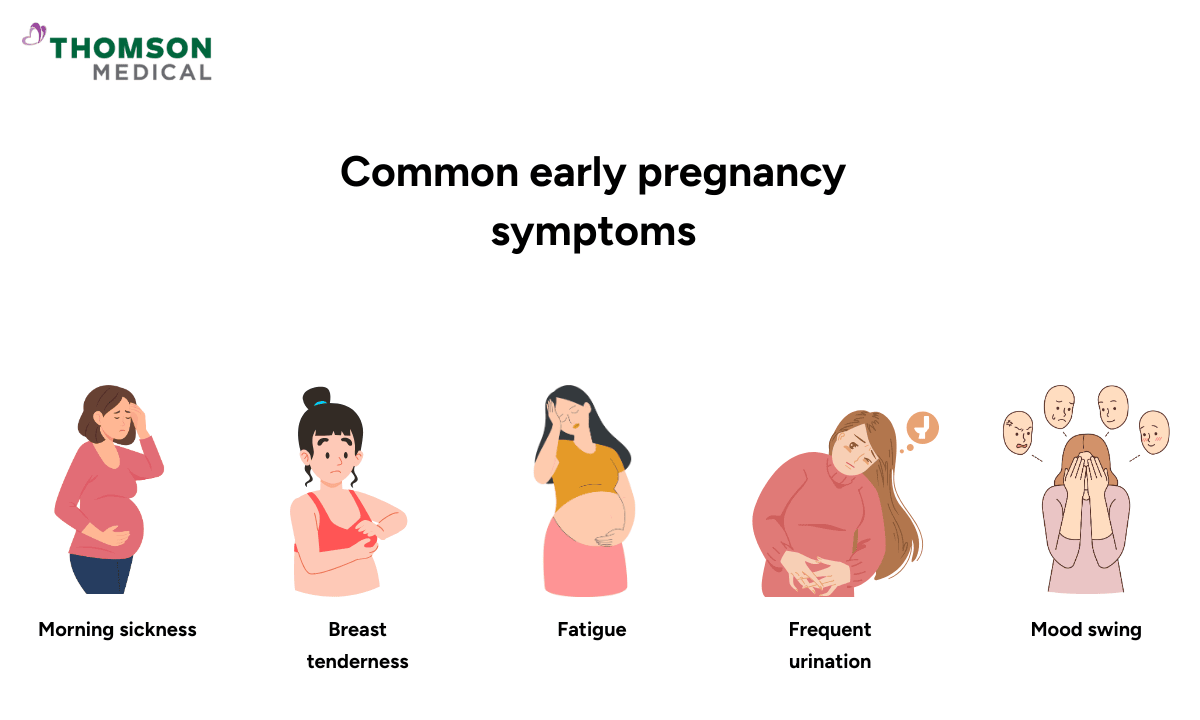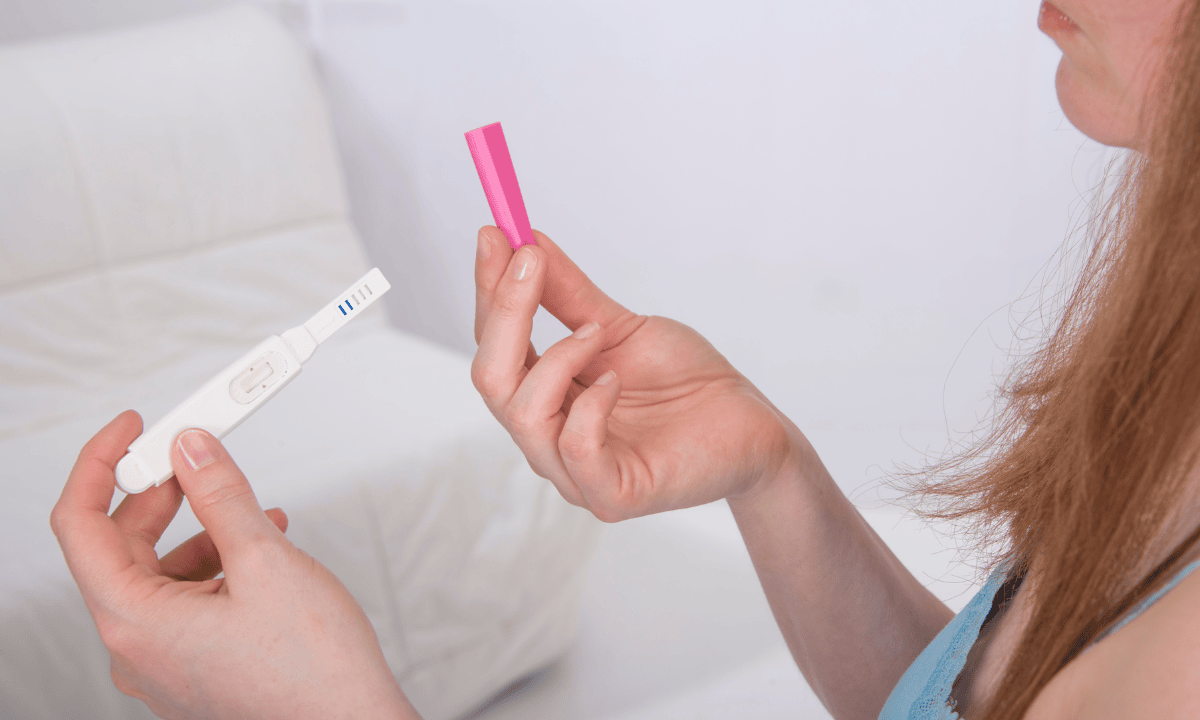That positive pregnancy test changes everything in an instant. You might feel excited, overwhelmed, or maybe a mix of both, and that's completely normal. While home tests are accurate, visiting your doctor help to confirm your pregnancy, checks that everything is progressing as expected, and putting you on the right path with personalised prenatal care tailored to your needs.
What are the first signs of pregnancy?

Usually, you will start to notice early pregnancy symptoms 1-2 weeks after missing your period. However, some women may experience changes well before that. Since every woman is different, some may experience very few or no early symptoms at all. Here are the most common early pregnancy symptoms you can look out for:
Missed period:
This symptom is usually the first thing that you will notice, especially if your menstrual cycle is usually regular.
Nausea or morning sickness:
Morning sickness can happen at any time of the day; it doesn't only happen in the mornings.
Extreme fatigue:
You may just feel unusually tired even when you feel like you have had enough sleep.
Breast changes:
You may notice that your breast tissue feels tender, swollen, or heavier than usual.
Frequent urination:
You may feel like you are using the bathroom more often than you used to.
Food changes:
You may suddenly dislike certain foods that you normally enjoy or experience cravings for foods that you typically don't crave.
Mild cramping or bloating:
You may feel cramping and bloating, similar to the symptoms you might experience but without your period.
Keep in mind that some of these symptoms can happen for other reasons too – stress, illness, or hormonal changes can cause similar signs. If you're experiencing several of these symptoms and think you might be pregnant, a home pregnancy test or visit to your doctor can give you an answer.
When should you take a pregnancy test?
To get the most reliable results, it is important to take the test at the right time. It is usually recommended that you take the test only after your expected period date.
If your period is 7 days late but you have no pregnancy symptoms, it doesn’t always mean you’re pregnant — hormonal changes, stress, or lifestyle factors can also delay your cycle. Still, taking a test can help you confirm and give you peace of mind.
When to tests?
Wait at least a few days after you have missed your period – this is the time to get the most reliable accuracy.
If you plan to test your pregnancy at home, do it in the morning, because that is when the hormone (human chorionic gonadotropin, or hCG) is the most concentrated in urine.
If your menstrual cycles are irregular, you can still take a pregnancy test if you think you might be pregnant.
Why is timing important?
Testing too early is the most common reason for false negative results of pregnancy, which can be disheartening. This is because the pregnancy hormone (hCG) needs time to build up in your urine to detectable levels.
If you test before your missed period, hCG levels might still be too low to detect – even if you are pregnant. This is why waiting just a few extra days can make all the difference in getting an accurate result. You may want to consider retesting if:
You have a negative test, and a week later you still have not received your period.
In the time since the negative test, you have begun to have early signs of pregnancy, despite a negative test.
You took the test very early and would like to have some confirmation of the pregnancy.
For the most reliable results, it’s recommended that you follow up a positive home test with an hCG blood test at a clinic, as this blood tests can detect pregnancy at an earlier stage.
When to visit a doctor to confirm pregnancy?
Here are some situations when it’s best to see a doctor to confirm your pregnancy.
After a positive home pregnancy test:
After doing a home pregnancy test that comes back positive, you might want to schedule your doctor's office visit within the next week or two. This will enable you to verify your pregnancy and initiate early prenatal care.
If you have an irregular cycle:
If you cannot remember when your last period started, or if you have irregular cycles, visiting the doctor early helps clarify your pregnancy dates..
If your symptoms differ from the typical early pregnancy symptoms:
You should get medical attention sooner if you experience these symptoms:
Severe pain in the abdomen
Heavy leaking of blood
Dizziness or fainting
Extreme vomiting
It may be possible that you are experiencing issues or complications such as an ectopic pregnancy or severe morning sickness (hyperemesis gravidarum).
If you've had a positive pregnancy test or suspect you might be pregnant, it’s recommended that you consult with an obstetrician or gynaecologist (O&G). Contact Thomson Medical to arrange your first prenatal appointment and receive personalised care tailored to your pregnancy journey.
Our O&G specialists
Loading...
Why should you schedule a doctor's appointment early in pregnancy?

Booking an appointment with a doctor early in your pregnancy is essential to support you and your baby's health. Your initial visit to the doctor is often called your first prenatal visit. All visits to the doctor during pregnancy are important, but there are definitely some important components of this initial visit:
Confirmation of pregnancy:
While your home pregnancy tests may have confirmed that you are pregnant, your doctor will provide medical confirmation through blood tests or ultrasound.
Confirming the location of the pregnancy:
Your doctor will check that the pregnancy is in your uterus, not in a fallopian tube (ectopic pregnancy). This is an important condition that needs to be addressed immediately.
Estimating a due date and tracking growth:
Your doctor will estimate your due date using your last menstrual period and early ultrasound measurements. This baseline information helps track your baby's development throughout pregnancy and gives you a clear timeline for planning ahead.
Assess for health issues:
At your first appointment, the doctor can begin some screening and assessment to evaluate any pre-existing conditions or risk factors that may need to be monitored or managed during the pregnancy.
Identifying problems early:
Your doctor will find any health problems you or your baby may have early on, as these issues are easiest to manage at this stage. Early identification makes conditions like high blood pressure, gestational diabetes, and thyroid problems much easier to manage.
Providing individual recommendations:
Your pregnancy doctor will recommend the appropriate prenatal vitamins to use, provide nutritional guidance about what foods to eat or avoid, offer recommendations for exercise, and discuss which medications you can safely use.
What to expect during your first pregnancy confirmation check?
When you have your first appointment, the doctor will do some of the tests and scans. This includes:
Review of your health history:
Your doctor will look at your medical history, including any previous pregnancies, medications, and family history.
Physical check-up:
Your gynae will check your general health during a physical examination. This will include measuring your body weight and blood pressure, which will provide your measurements for further comparisons during your pregnancy. Your doctor may also do a pelvic exam to check your reproductive health.
Pregnancy testing:
Either a urine or blood test will be performed to confirm your pregnancy.
First ultrasound scan:
You can usually have an ultrasound scan around six weeks. This will let your doctor see the gestational sac (where your baby is growing) and observe your baby's heartbeat.
Prenatal health advice:
You will be given advice about taking vitamins and how to stay healthy during your pregnancy.
What if you can't see a doctor right away?
If you need to wait a few weeks for your appointment, here are some important steps you can take in the meantime:
- Start your prenatal vitamins:
- Take a prenatal vitamin with folic acid (400-800 mcg) every day. Folic acid is essential in early pregnancy to promote the healthy development of the brain and spine of your unborn baby.
- Avoid toxins:
- If you drink alcohol or smoke, it’s recommended that you refrain from doing so. You should also check with your doctor before taking any over-the-counter medication or supplements, as not everything is safe during pregnancy.
- Eat well:
- Focus on eating whole foods such as fresh vegetables and fruits, whole grains, and protein. Getting good nutrition early in your pregnancy is essential to supporting your baby's development.
- Take care:
- Early pregnancy can be tiring, and it is important to listen to your body. Sleep when you are exhausted and keep yourself hydrated.
Ready to confirm your pregnancy and start prenatal care? Our obstetrics team at Thomson Medical is here to guide you through your first appointment and answer any questions you have. Book your consultation today.
FAQ
How accurate are home pregnancy tests?
Home pregnancy tests are over 99% accurate when used correctly after a missed period. Testing too early or not following instructions can reduce accuracy, so if you get a negative result but still suspect pregnancy, wait a few days and retest with your first morning urine.
Can I visit the doctor too early?
Yes, visiting before 5-6 weeks may be too early to see anything on the ultrasound scan. Your doctor can confirm pregnancy with a blood test and will ask you to return in 1-2 weeks for a scan when the embryo is visible.
Will a doctor always do an ultrasound to confirm pregnancy?
Doctors usually perform ultrasounds from 6 weeks onwards to confirm your pregnancy and detect your foetus's heartbeat. If you're very early in pregnancy, your doctor may start with a blood test before scheduling an ultrasound for a later date.
What if I have no symptoms but a positive test?
This is completely normal, as not all women experience early pregnancy symptoms like nausea or fatigue. The absence of symptoms doesn't mean anything is wrong, and your doctor can confirm a healthy pregnancy through blood tests and an ultrasound scan.
Is spotting before my appointment a concern?
Light vaginal spotting can be normal in early pregnancy due to implantation or hormonal changes. However, contact your doctor immediately if you experience heavy bleeding, severe cramping, sharp pain, or dizziness.
Can I start prenatal vitamins before my first visit?
Yes, start taking folic acid (400-800 mcg daily) as soon as you suspect pregnancy. Folic acid is essential in the first few weeks for preventing neural tube defects, often before you even know you're pregnant.
The information provided is intended for general guidance only and should not be considered medical advice. For personalised recommendations and tailored advice, please consult a specialist at Thomson Medical. Request an appointment with Thomson Medical today.
For more information, contact us:
Thomson Specialists (Women's Health)
Thomson Women's Clinic (TWC)
- Novena:
6592 6686 (Call), 8611 8986 (WA) - Bukit Batok:
6569 0668 (Call), 8686 3525 (WA) - Choa Chu Kang:
6893 1227 (Call), 8282 1796 (WA) Jurong:
6262 8588 (Call), 6262 8588 (WA)- Katong (female doctor):
6970 2272 (Call), 8611 9020 (WA) - Punggol:
6243 6843 (Call), 8811 0328 (WA) - Sembawang: 6753 5228
- Sengkang: 6388 8125
- Serangoon (female doctor): 6382 3313
- Tampines: 6857 6266
- Tiong Bahru: 6276 1525
